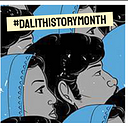Dalit History Month 2019 — Celebrating Bhanwari Devi
“In the fight against sexual harassment, be brave — Bhanwari Devi”
Today, in #DalitHistoryMonth, and in the era of #MeToo, we celebrate the long-standing struggle led by Bhanwari Devi for gender justice and equity. We honour her contribution as someone who relentlessly worked for women’s rights and dignity, and laid the foundation for legislation that criminalized workplace sexual harassment.
Bhanwari Devi is an oppressed-caste woman who dared to fight against the feudal, casteist and patriarchal structures of rural Rajasthan. She started as a social worker as part of the government-run Women’s Development Project. In 1992, she became involved in specific campaigns against child marriage. She counselled women on family planning, girl child education, against female foeticide, dowry, and child marriage. Already, as a result of her activism, she and her family were subjected to constant threats and intimidation by the dominant caste men in the village.
Once she intervened to stop the marriage of a nine-month-old infant from a dominant caste family. This enraged the dominant caste men in the village. Despite knowing the consequences that were likely, she dared to continue to defy them and stand for what was right. The same year, in an act of retaliation, she was gang-raped and her husband beat-up while working on the field.
In her subsequent pursuit for justice, every step along the way she faced intense hurdles. At the police station, at the primary health care center, and the judiciary.
Bhanwari Devi’s case was one of the very few cases of caste-based sexual violence that gained national attention. With no strong legal legislation that addressed sexual harassment at the workplace then, Bhanwari Devi had to face immense difficulties just to argue her case. She and her family experienced exclusion and insensitivity both within the community as well as from the police and judiciary. Despite her relentless struggle to fight against her rapists, in 1995 the Rajasthan High Court acquitted all the accused in the case.
Some horrendous reasons for the acquittal were that the “upper” caste men cannot rape a “lower”-caste woman because of reasons of purity, that men of different castes cannot participate in gang rape, and that older men of 60–70 years of age cannot commit rape.
Following the acquittal, feminist groups and other progressive civil society groups under the platform of Vishaka filed a public interest petition in the Supreme Court. Here, the prime objective was to make the working place safer for women. Eventually, these Vishaka guidelines were translated to a full fledge legislations known as the Sexual Harassment of Women at Workplace (Prevention, Prohibition and Redressal) Act, 2013. This piece of legislation stemming from Bhanwariji’s efforts now helps women across India fight for their right to a sexual-harassment free workplace.
Unfortunately, Bhanwari Devi herself failed to get justice, even after 26 years of the incident her appeal in the trial court remains pending. But she hasn’t been silenced. For the last 26 years, she has vociferously spoken for women rights. For her courage and perseverance, she was honoured with Neeraja Bhanot award. She also represented the United Nations Fourth World Conference on women in Beijing in 1995.
Bhanwari Devi’s struggle highlighted the gravity of caste-based sexual violence in India. With the incorporation of the intersectionality of gender, caste and class, it completely transformed the discourse of women rights in India.
She herself, is still fighting for her own justice.
Today, we salute Bhanwari Devi ji for her courage, determination, and strength. Her immense contribution to the rights of women continues to inspire millions. We stand with her in her struggle.
This post was written for Dalit History Month by Ashwini KP. Ashwini is a researcher and works on issues related to human rights, Dalit women, caste and social exclusion. You can reach her at ashwini.kp16@gmail.com
Sources
Shruti Kedia, Meet the woman whose lifelong struggle laid the foundation for laws against sexual harassment in the workplace, 8th Jan 2018, https://yourstory.com/2018/01/bhanwari-devi-vishaka-guidelines.
Banwari Devi: A hero we failed, https://feminisminindia.com/2017/03/03/bhanwari-devi-essay/
M. Alston, Women, Political Struggles and Gender Equality in South Asia, Springer Publication.
Geetanjali Gangoli, Indian Feminisms: Law, Patriarchies and Violence in India, 2007, Ashgate Publishing, New York.
Savitri Goonesekere, Violence, Law and Women’s Rights in South Asia, 2004, Sage Publications, New Delhi.
Archana Nathan, Dalit woman’s rape in ’92 led to India’s first sexual harassment law — but justice still eludes her, https://scroll.in/article/899044/dalit-womans-rape-in-92-led-to-indias-first-sexual-harassment-law-but-justice-still-eludes-her
Geeta Pandey, Bhanwari Devi: The rape that led to India’s sexual harassment law, https://www.bbc.com/news/world-asia-india-39265653.
